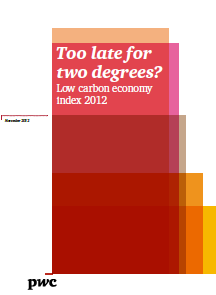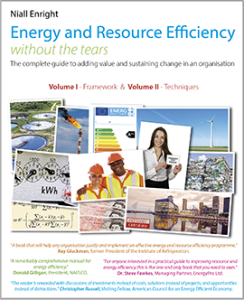 The Japanese have a word Mottainai which “reflects a sense of regret concerning waste” which can “lead to anger or protest when the person who is observing the utter waste is incapable of holding back their emotions”. Well that sure sounds like a polite way of describing how I am feeling just now….
The Japanese have a word Mottainai which “reflects a sense of regret concerning waste” which can “lead to anger or protest when the person who is observing the utter waste is incapable of holding back their emotions”. Well that sure sounds like a polite way of describing how I am feeling just now….
Why? Well I have just read a new report from PWC: Too late for two degrees? which makes very sobering reading.
We know that each year that we allow CO2 and other greenhouse gasses to accumulate in the atmosphere means that subsequent reductions need to be greater.
Back in 2000, in order to have a 50% change of global temperature rises not exceeding 2 degrees Centigrade, we needed to decarbonise our economy at the rate of 3.7% per annum to 2050. Today that target has risen to 5.1% a year because we have wasted the last decade with an average global rate of decarbonisation of just 0.8% a year.
This report shows the UK, France, Germany and the US achieving the greatest emissions reductions over the last decade – however the average for these leaders was just between 2 and 3%, about half what is needed. At the other end of the spectrum is Australia whose emissions per unit GDP grew a staggering 6.7% last year.
China, India and Turkey are other fast-growing economies where there has been either no emissions reductions at all or a growth in emissions per unit of GDP last year. Before we Europeans allow ourselves to be overwhelmed by smugness we should recognise the inadequacy of our own efforts and the fact that many emissions recorded in the fast growing economies are actually the product of our own consumption.
So how likely is it that we can still achieve two degrees? According to PWC:
Even to have a reasonable prospect of getting to a 4°C scenario would imply nearly quadrupling the current rate of decarbonisation.
The decarbonisation rate required for a 2°C world has not been achieved in a single year since World War 2. The closest the world came to that rate of decarbonisation was during the severe recessions of the late 1970s/early 1980s (4.9% in 1981) and the late 1990s (4.2% in 1999).
Even if we double our current rate of decarbonisation, global atmospheric CO2 concentrations are likely to hit 1,200 parts per million and temperatures will rise by six degrees. That is hugely dangerous territory in terms of the survival of our civilisation.
So it is time now for our politicians to stop pussyfooting around and act decisively on Climate Change – for example the UK government should stop objecting to the EU recognising the high carbon content of tar-sands-derived oil from Canada.
Global corporations, having to some extent neutered regulation by nation-states, now need to step up to plate and take responsibility for the present predicament. Not because they are having a sudden bout of conscience but because beyond 2 degrees represent an unprecedented and wholly unacceptable risk to shareholder value. It is simply a matter of fiduciary duty.
What is clear from the report is that “business as usual” is not an option. Each day that passes means that mankind’s only option will be to mobilise an effort of a scale Paul Gilding’s One-degree War.
We can do this! But it is time to let a little creative anger and indignation spurn us into action. Mottainai!



0 Comments